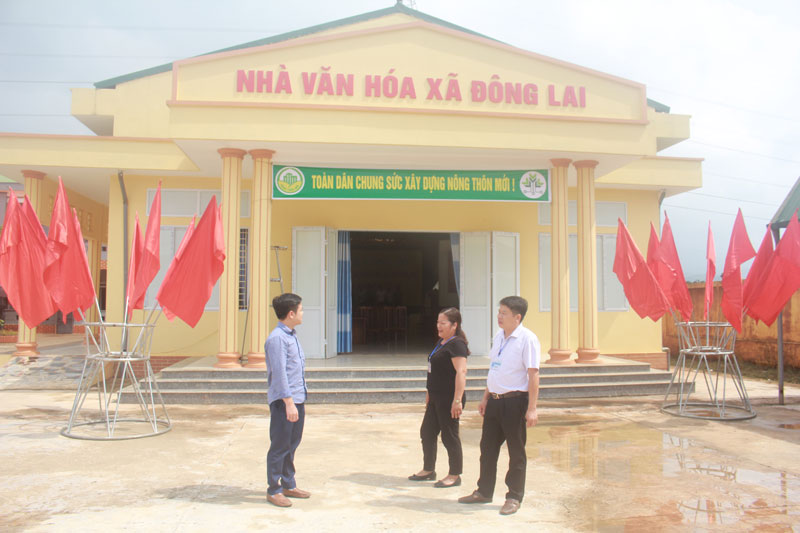
(HBO) – From a poor locality with limited infrastructure, an agriculture-based economy, low per capita income and a high poverty ratio, Dong Lai commune in Hoa Binh’s Tan Lac district has witnessed considerable progress after nine years of implementing the National Target Programme on New-Style Rural Area Building. So far, the commune has completed all 19 criteria of the programme, while living conditions of local residents have significantly improved.
 The Central Culture House of Dong Lai commune has been built to meet
the criteria of a new-style rural area and the demands of local residents and
officials.
The Central Culture House of Dong Lai commune has been built to meet
the criteria of a new-style rural area and the demands of local residents and
officials.
So far, the commune has mobilized
over 51 billion VND (2.19 million USD) for the programme, of which 10.5 billion
VND was contributed by local residents in the form of cash, work, land and
other assets.
Local infrastructure has been
upgraded, while the socio-economic situation in the commune has improved. Currently,
62 percent of inter-field and 55 percent of inter-village roads have been paved,
and all households have access to clean water, while schools in the locality
have been standardized.
A new culture house of the
commune has been built, along with culture houses in every village. Up to 96
percent of locals have joined health insurance.
The improved infrastructure has
created favourable conditions for locals to develop their economic conditions
and reduce the poverty ratio. Many households have switched cultivation strategy
from rice to other crops with higher value.
The commune now has 75 hectares
of lemongrass and more than 200 hectares of citrus trees. The per capita income
among locals has risen to 32.3 million per year from 21 million VND in 2011,
while the poor household ratio has reduced to 11.3 percent.
Bui Van Su, Chairman of the Dong
Lai People’s Committee, said that during the implementation of the programme,
the commune has received donations of 42,400 sq.m of land from more than 1,000
households.
He attributed the result to the
transparent and democratic way the programme has been implemented. Local
residents have become major contributors to the construction of infrastructure
that directly benefit them, he said, stressing the pioneering role of local
officials and Party members./.
Hoa Binh province is undergoing a dynamic transformation amid Vietnam’s national digital transition. Building on Poliburo’s Resolution No. 57-NQ/TW on breakthroughs in science, technology, innovation, and national digital transformation, the province has rolled out a wide range of practical action plans. A standout initiative is the "Digital Literacy for All” movement, an effort to ensure that no one is left behind in the digital era.
Hoa Binh province is undergoing a dynamic transformation in the wake of the national digital transformation movement. Building on Resolution No. 57-NQ/TW of the Politburo on breakthroughs in science, technology, innovation, and national digital transformation, the province has implemented a wide range of practical action plans. A standout initiative is the "Digital Literacy for All” movement ambitious effort to ensure that no one is left behind in the digital age.
With a spirit of unity and proactive problem-solving, the Party Committee, the government and the people of Dong Lai Commune (Tan Lac District) have made great strides in implementing the resolutions of the 24th Party Congress of the commune for the 2020 - 2025 term. Focusing on leadership and practical actions, the commune has brought the Party’s resolutions into daily life, creating strong impacts and pushing the local development forward.
Amid the nationwide push for digital transformation, young people in Hoa Binh Province are stepping up as dynamic pioneers, applying technology to enhance Youth Union operations and expand the reach of youth-led initiatives. Through creativity and adaptability, Youth Union organizations at all levels have introduced a series of practical solutions, contributing to modern governance and community development.
In recent years, An Nghia commune, located in Lac Son district, has stepped up administrative reform, focusing on improving the quality and efficiency of its single-window service unit for receiving and processing administrative procedures. These improvements have helped create favourable conditions for local residents and organisations to handle administrative procedures, contributing to the commune’s broader socio-economic development.
The Prime Minister-approved master plan to develop the multi-use value of forests ecosystems through 2030, with a vision to 2050, aims to improve the management and sustainable use of forest resources, create jobs, increase incomes, and improve the living standards of ethnic minorities, people in mountainous and remote areas, forest workers and those living near forests.



 The Central Culture House of Dong Lai commune has been built to meet
the criteria of a new-style rural area and the demands of local residents and
officials.
The Central Culture House of Dong Lai commune has been built to meet
the criteria of a new-style rural area and the demands of local residents and
officials.